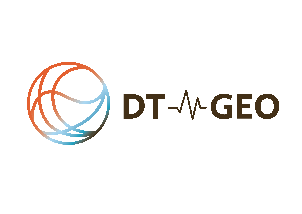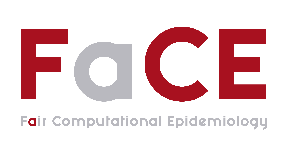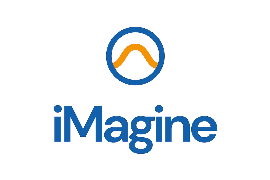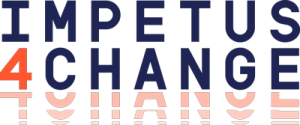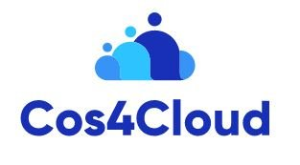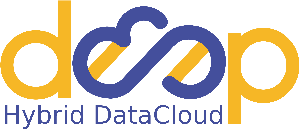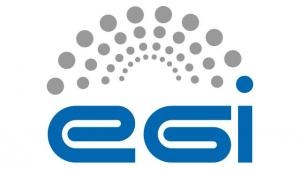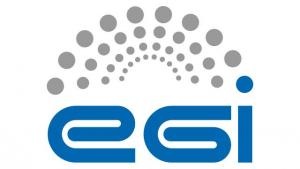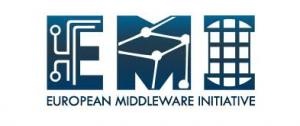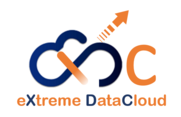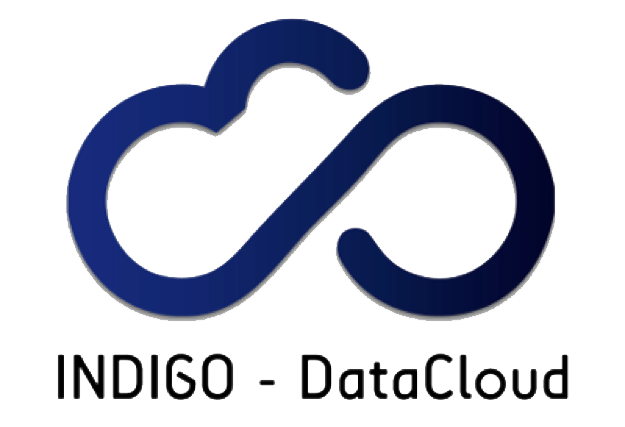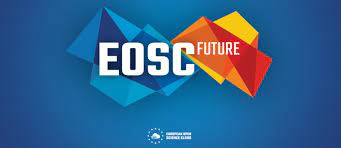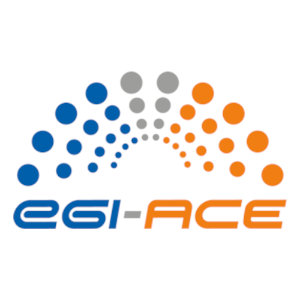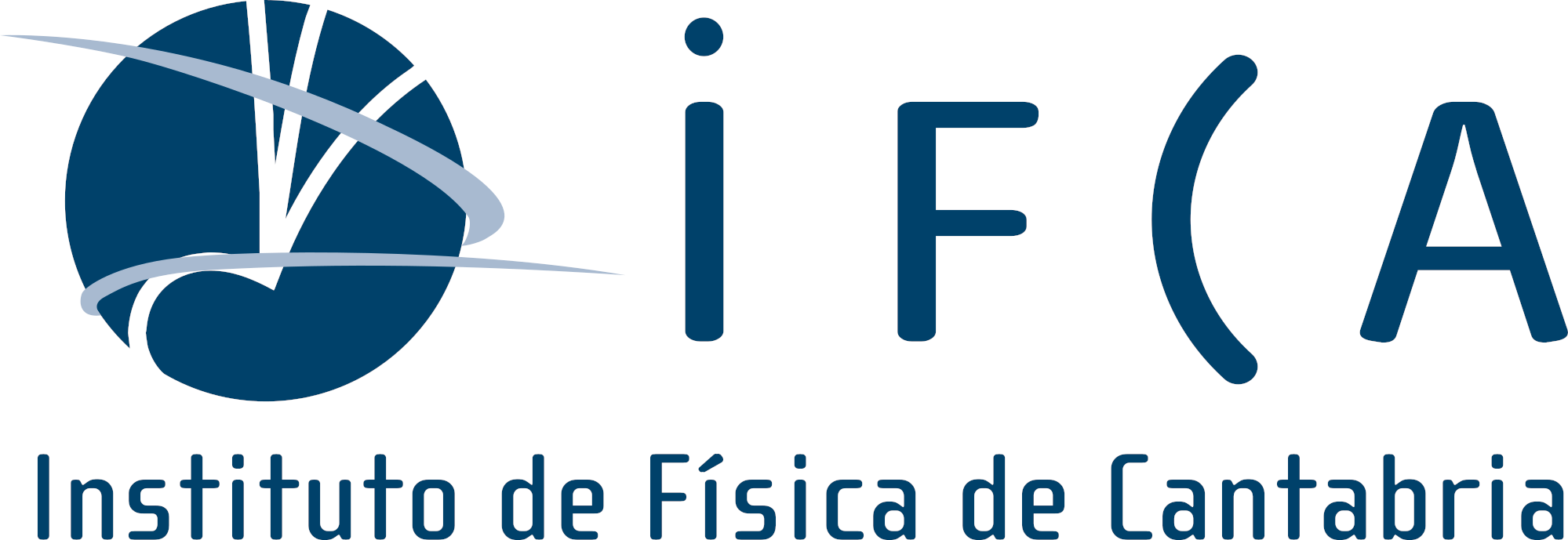Ongoing projects
AI4EOSC
Artificial Intelligence for the European Open Science Cloud
PROJECT COORDINATOR
The AI4EOSC (Artificial Intelligence for the European Open Science Cloud) delivers an enhanced set of advanced services for the development of Artificial Intelligence (AI), Machine Learning (ML) and Deep Learning (DL) models and applications in the European Open Science Cloud (EOSC). These services are bundled together into a comprehensive platform providing advanced features such as distributed, federated and split learning; novel provenance metadata for AI/ML/DL models; event-driven data processing services or provisioning of AI/ML/DL services based on serverless computing. The project builds on top of the DEEP-Hybrid-DataCloud outcomes and the EOSC compute platform and services in order to provide this specialized compute platform. Moreover, AI4EOSC offers customization components in order to provide tailor made deployments of the platform, adapting to the evolving user needs.
The main outcomes of the AI4EOSC project will be a measurable increase of the number of advanced, high level, customizable services available through the EOSC portal, serving as a catalyst for researchers, facilitating the collaboration, easing access to high-end pan-European resources and reducing the time to results; paired with concrete contributions to the EOSC exploitation perspective, creating a new channel to support the build-up of the EOSC Artificial Intelligence and Machine Learning community of practice.
SIESTA
Secure Interactive Environments for SensiTive data Analytics
PROJECT COORDINATOR
The SIESTA project aims to provide a set of tools, services, and methodologies for the effective sharing of sensitive data in the EOSC, following a cloud-based model and approach. SIESTA will provide user-friendly tools with the aim of fostering the uptake of sensitive data sharing and processing in the EOSC. The project will deliver trusted cloud-based environments for the management and sharing of sensitive data that are built in a reproducible way, together with a set of services and tools to ease the secure sharing of sensitive data in the EOSC through state-of-the-art anonymization techniques. The overall objective is to enhance the EOSC Exchange services by delivering a set of cloud-based trusted environments for the analysis of sensitive data in the EOSC demonstrating the feasibility of the FAIR principles over them.
CDS modernization
The Copernicus Data Store (CDS) Modernization will provide state-of-the-art technologies for the current CDS operated nby ECMWF, resulting in a more robust infrastructure and services.
DT-GEO
A Digital Twin for GEOphysical Extremes
Merging research on geosciences and supercomputing to analyze and forecast tsunamis, earthquakes and volcanic eruptions.
Coordinated by GEO3BCN – CSIC, DT-GEO comprises 26 European organisations across research and technology.
Each partner will collaborate closely to ensure an integrated approach, whilst bringing its special focus to the project.
EUCAIM
Cancer Image Europe is pioneering a pan-European federated infrastructure for cancer images, fuelling AI innovations. Our mission is to build a pan-European digital federated infrastructure of cancer-related images, which will be used for the development of AI tools toward Precision Medicine. We hope that this infrastructure will provide the means to develop AI tools that will be able to enhance the (cancer) diagnosis procedure, treatment and the identification of the need for predictive medicine benefiting patients across Europe.
Cancer Image Europe provides a robust, trustworthy platform for researchers, clinicians, and innovators to access diverse cancer images, enabling the benchmarking, testing, and piloting of AI-driven technologies. By connecting high-quality cancer image data and AI experts, Cancer Image Europe facilitates collaboration and accelerates the development of cutting-edge solutions for cancer diagnosis and treatment.
FACE
FACE - FAir Computational Epidemiology
PROJECT COORDINATOR
The FACE project envisions a huge opportunity in providing an open modeling and simulation platform where scientists can exploit a wide variety of datasets, with different access and privacy policies, as a way to provide rapid responses to epidemics outbreaks through research infrastructure services underpinning and supporting epidemics research.
GreenDIGIT
Greener Future Digital Research Infrastructures
GreenDIGIT brings together 4 major distributed Digital Infrastructures at different lifecycle stages, EGI, SLICES, SoBigData, EBRAINS, to tackle the challenge of environmental impact reduction with the ambition to provide solutions that are reusable across the whole spectrum of digital services on the ESFRI landscape, and play a role model. GreenDIGIT will capture good practices and existing solutions and will develop new technologies and solutions for all aspects of the digital continuum: from service provisioning to monitoring, job scheduling, resources allocation, architecture, workload and Open Science practices, task execution, storage, and use of green energy. GreenDIGIT will deliver these solutions as building blocks, with a reference architecture and guidelines for RIs to lower their environmental footprint. It will include the extension of a workload manager, Virtual Machine Manager, AI/ML training framework, and IoT/5G/network management solutions from 4 participating RIs with new brokering logic to optimize task execution toward low-energy use. User-side tools and Virtual Research Environments will also be expanded with energy usage reporting and reproducibility capabilities to motivate users to apply low-energy practices. The new solutions will be validated through reference scientific use cases from diverse disciplines and will be promoted to providers and users through an active dissemination and training programme, in order to prepare the next generation of Digital RIs with a low environmental footprint.
iMagine
Imaging data and services for aquatic science
iMagine provides a portfolio of free at the point of use image datasets, high-performance image analysis tools empowered with Artificial Intelligence (AI), and Best Practice documents for scientific image analysis. These services and materials enable better and more efficient processing and analysis of imaging data in marine and freshwater research, accelerating our scientific insights about processes and measures relevant for healthy oceans, seas, coastal and inland waters.
By building on the computing platform of the European Open Science Cloud (EOSC) the project delivers a generic framework for AI model development, training, and deployment, which can be adopted by researchers for refining their AI-based applications for water pollution mitigation, biodiversity and ecosystem studies, climate change analysis and beach monitoring, but also for developing and optimising other AI-based applications in this field.
The iMagine compute layer consists of providers from the pan-European EGI federation infrastructure, collectively offering over 132,000 GPU-hours, 6,000,000 CPU-hours and 1500 TB-month for image hosting and processing. The iMagine AI framework offers neural networks, parallel post-processing of very large data, and analysis of massive online data streams in distributed environments. 13 RIs will share over 9 million images and 8 AI-powered applications through the framework. Having representatives so many RIs and IT experts, developing a portfolio of eye-catching image processing services together will also give rise to Best Practices. The synergies between aquatic use cases will lead to common solutions in data management, quality control, performance, integration, provenance, and FAIRness, contributing to harmonisation across RIs and providing input for the iMagine Best Practice guidelines. The project results will be integrated into and will bring important contributions from RIs and e-infrastructures to EOSC and AI4EU.
Impetus4Change
The overarching objective of I4C is to improve the quality, accessibility and usability of near-term climate information and services at local to regional scales to strengthen and support end-user adaptation planning and action. I4C will commit to Open Science through development of open access tools and exploitation of data/model outputs via relevant platforms thereby ensuring improved accessibility and usability of climate knowledge in the context of the EOSC.
InterTwin
Co-designing and prototyping an interdisciplinary Digital Twin Engine.
interTwin is an EU-funded project with the goal to co-design and implement the prototype of an interdisciplinary Digital Twin Engine – an open source platform based on open standards that offers the capability to integrate with application-specific Digital Twins.
Its functional specifications and implementation are based on a co-designed interoperability framework and conceptual model of a DT for research – the DTE blueprint architecture.
WineGut_BrainUP project
TÍTULO DEL PROYECTO: Un enfoque integral para entender la relación entre el consumo de vino, la dieta y la modulación del microbioma en la enfermedad de Alzheimer (WineGut_BrainUP project) (PID2019-108851RB)
PROMOTOR: CONSEJO SUPERIOR DE INVESTIGACIONES CIENTÍFICAS (CSIC)
CENTRO DE ADSCRIPCIÓN: Instituto de Investigación en Ciencias de la Alimentación (CIAL, Madrid) e Instituto de Ciencias de la Vid y el Vino (ICVV, La Rioja)
MAPSIA
TÍTULO DEL PROYECTO: Computer vision system based on Deep Learning capable of detecting, localizing and categorizing 13 different types of superficial road defects, from 2D photos.
PROMOTOR: Funded by MICIU/AEI/10.13039/501100011033 and the European Union Next Generation EU/PRTR
CENTRO DE ADSCRIPCIÓN: GITECO e IFCA
Past projects
AARC-2
The Authentication and Authorisation for Research and Collaboration (AARC) initiative was first launched in May 2015 to address the increased need for federated access and for authentication and authorisation mechanisms by research and e-infrastructures.
Running for two years, AARC was funded by the European Union’s Horizon 2020 research and innovation programme under Grant Agreement 653965.
A second phase of the project (AARC2) started in May 2017 to continue to develop and pilot an integrated cross-discipline authentication and authorisation framework, building on existing authentication and authorisation infrastructures (AAIs).
AARC2 is funded by the European Union’s Horizon 2020 research and innovation programme under Grant Agreement 730941.
Clima-Comp
Clima-Comp
Proyectos Explora Ciencia y Explora Tecnología
Closed project
COOP+ Promoting collaboration among RIS
COOP+ Promoting collaboration among RIS
The general objective is to analyse how to address cross-disciplinary Global challenges in environmental sciences by joining the data and know-how resources of international Research Infrastructures in collaboration
Start: 03/2016
End: 07/2018
www.coop-plus.eu
COOPEUS - Cooperation EU/US
COOPEUS (Strengthening the cooperation between the US and the EU in the field of environmental research infrastructures. Grant Agreement number: CSA-312118).
Developing world-class research infrastructures for environmental research is one of the top priorities of European authorities. This proposal brings together scientists and users being involved in Europe’s major environmental related research infrastructure projects, i.e. EISCAT, EPOS, LifeWATCH, EMSO, and ICOS, with their US counterparts that are responsible for the NSF funded projects AMISR, EARTHSCOPE, DataONE, OOI and NEON. The intention is that by interlinking these ac…
Start: 01/09/2012
End: 31/08/2015
Closed project
Cos4Cloud
COS4CLOUD (Co-designed citizen observatories for the EOS-Cloud) aims to design prototyped and implemented services that address the Open Science challenges shared by Citizen observatories of biodiversity, based on the experience of platforms like: Artportalen, Natusfera, iSpot, as well as other environmental quality monitoring platforms like: FreshWater Watch, KdUINO, OdourCollect, iSpex and CanAir.io.
The innovative services will be designed, prototyped and implemented for improving the data and information quality using deep machine learning, automatic video recognition, advanced mobile app interfaces, and other cutting-edge technologies, based on data models and data protocols validated by traditional science. The new services will provide mechanisms to ensure the visibility and recognition of data contributors and the tools to improve networking between various stakeholders. Novel innovative digital services will be developed through the integration of CS products, generated by different providers, following open standards to ensure their interoperability, and offered in agile, fit-for-purpose and sustainable site available through EOSC hub, including a discovery service, to both traditional and citizen scientists.
The design of new services will be user oriented, engaging a wide range of stakeholders in society, government, industry, academia, agencies, and research to co-design service requirements. As a result, COS4CLOUD will integrate citizen science in the European Open Science Cloud, bringing Citizen Science (CS) projects as a service for the scientific community and society at large.
DEEP - Hybrid-DataCloud
PROJECT COORDINATOR
The Designing and Enabling E-infrastructures for intensive Processing in a Hybrid DataCloud (DEEP-Hybrid-DataCloud) is project funded by the European Union’s Horizon 2020 research and innovation programme under grant agreement No 777435. The key concept proposed in the DEEP-Hybrid-DataCloud project is the need to support intensive computing techniques that require specialized HPC hardware, like GPUs or low-latency interconnects, to explore very large datasets. A Hybrid Cloud approach enables the access to such resources that are not easily reachable by the researchers at the scale needed in the current EU e-infrastructure.
We also propose to deploy under the common label of “DEEP as a Service” a set of building blocks that enable the easy development of applications requiring these techniques: deep learning using neural networks, parallel post-processing of very large data, and analysis of massive online data streams . These services will be deployed in the project testbed, offered to the research communities linked to the project through pilot applications, and integrated under the EOSC framework, where they can be further scaled up in the future
https://deep-hybrid-datacloud.eu
DORII - Deployment of Remote Infrastructure
DORII - Deployment of Remote Infrastructure
FP7-INFRASTRUCTURES-2007-1
Start: 2008-02-01
End: 2010-07-31
Closed project
EGI-Engage
EGI-Engage (Engaging the EGI Community towards an Open Science Commons. Grant Agreement number 654142) and EGI-InSPIRE (Integrated Sustainable Pan-European Infrastructure for Researchers in Europe. Grant Agreement number RI-261323).
EGI-Engage will accelerate advancements across the EGI Infrastructure in strategy, policy, business and technical innovation, user engagement towards researchers within the long-tail of science, domain-specific research communities, Research Infrastructures (RIs) within the ESFRI roadmap, as well as SMEs and industry at large.
Start: 01/03/2015
End: 31/08/2017
Closed project
https://wiki.egi.eu/wiki/EGI-Engage
EGI InSPIRE
EGI InSPIRE - Integrated Sustainable Pan-European Infrastructure for Researchers in Europe
Start: 01/05/2010
End: 01/05/2014
Closed project
https://wiki.egi.eu/wiki/EGI-InSPIRE:Main_Page
EMI - European Middleware Initiative
EMI is a collaboration of the three major middleware providers in Europe, ARC, gLite and UNICORE, and other consortia. It aims to deliver a consolidated set of middleware components for deployment in EGI, PRACE and other DCIs; extend the interoperability between grids and other computing infrastructures; strengthen the reliability of the services; and establish a sustainable model to maintain and evolve the middleware, fulfilling the requirements of the user communities.
Start: 01/05/2010
End: 30/04/2013
Closed project
EOSC - Hub
The EOSC-hub project brings together multiple service providers to create the Hub: a single contact point for European researchers and innovators to discover, access, use and reuse a broad spectrum of resources for advanced data-driven research. For researchers, this will mean a broader access to services supporting their scientific discovery and collaboration across disciplinary and geographical boundaries.
The project mobilises providers from the EGI Federation, EUDAT CDI, INDIGO-DataCloud and other major European research infrastructures to deliver a common catalogue of research data, services and software for research. EOSC-hub collaborates closely with GÉANT and the EOSCpilot and OpenAIRE-Advance projects to deliver a consistent service offer for research communities across Europe.
EOSC-hub is funded by the European Union’s Horizon 2020 research and innovation programme under grant agreement 777536. The generous EU funding received by the project is complemented with a contribution from the EGI Foundation and its participants, and in-kind contributions made available by service providers of the EGI Federation.
EUFORIA - EU For ITER Applications
EUFORIA (EU Fusion fOR Iter Applications) is a project funded by European Union under the Seventh Framework Programme (FP7) which will provide a comprehensive framework and infrastructure for core and edge transport and turbulence simulation, linking grid and High Performance Computing (HPC), to the fusion modelling community.
Start: 01/01/2018
End: 31/12/2010
Closed project
eXtreme DataCloud
The eXtreme DataCloud (XDC) is a EU H2020 funded project under grant agreement 777367, aimed at developing scalable technologies for federating storage resources and managing data in highly distributed computing environments. The services provided will be capable of operating at the unprecedented scale required by the most demanding, data intensive, research experiments in Europe and Worldwide.
XDC will be based on existing tools, whose technical maturity is proved and that the project will enrich with new functionalities and plugins already available as prototypes (TRL6+) that will be brought at the production level (TRL8+) at end of XDC.
The targeted platforms are the current and next generation e-Infrastructures deployed in Europe, such as the European Open Science Cloud (EOSC), the European Grid Infrastructure (EGI), the Worldwide LHC Computing Grid (WLCG) and the computing infrastructures funded by other public and academic initiatives.
All the developments will be community-driven and tested against real life use cases provided by the consortium partners representing research communities belonging to a variety of scientific domains: Life Science, Astrophysics, High Energy Physics, Photon Science and Clinical Research.
The XDC project aims at opening new possibilities to scientific research communities in Europe and worldwide by supporting the evolution of e-Infrastructure services for Exascale data resources. The XDC software will be released as Open Source platforms available for general exploitation.
http://www.extreme-datacloud.eu
INDIGO - DataCloud
INDIGO-DataCloud (INtegrating Distributed data Infrastructures for Global ExplOitation. Grant Agreement number RIA 653549).
The INDIGO-DataCloud project (INDIGO for short) aims at developing a data/computing platform targeted at scientific communities, deployable on multiple hardware, and provisioned over hybrid (private or public) e-infrastructures. This platform will be built by leading European developers, resource providers, e-infrastructures and scientific communities in order to ensure its successful exploitation and sustainability.
Start: 01/04/2015
End: 30/09/2017
Closed project
https://www.indigo-datacloud.eu/
EOSC Future
EOSC Future responds to INFRAEOSC-03-2020 call in order to integrate, consolidate, and connect e-infrastructures, research communities, and initiatives in Open Science to further develop the EOSC Portal, EOSC-Core and EOSC-Exchange of the European Open Science Cloud (EOSC).
EOSC Future is structured around six thematic pillars that strategically group the work package tasks and activities and coherently present the key objectives and activities of the project to stakeholders: Pillar 1 on Policy & Strategy will coordinate and support a strategic vision for the future EOSC; Pillar 2 on Connection & Integration will connect and integrate EOSC infrastructures, data, and services; Pillar 3 on Excellent Science & Interdisciplinarity will extend the EOSC value Chain with scientific use cases; Pillar 4 on Growth & Innovation will grow and innovate EOSC with value-added services; Pillar 5 on Skills & Training will train users and providers of the EOSC ecosystem; and Pillar 6 on Engagement & Communications will engage the wider EOSC Community at a global level.
Duration : from 01-04-2021 to 30-09-2023
EU Contribution : EUR 40 894 051,25
EGI-ACE
EGI-ACE is a project coordinated by the EGI Foundation with a mission to empower researchers from all disciplines to collaborate in data- and compute-intensive research through free-at-point-of-use services.
Building on the distributed computing integration in the EOSC-hub project, EGI-ACE will deliver the EOSC Compute Platform and will contribute to the EOSC Data Commons through a federation of cloud compute and storage facilities, PaaS services and data spaces with analytics tools and federated access services.
The consortium of the project builds on the expertise and assets of the EGI federation members, key research communities, data providers and collaborating initiatives.
EGI-ACE’s main goal is to implement the compute platform of the European Open Science Cloud and contribute to the EOSC Data Commons by delivering integrated computing platforms, data spaces and tools as an integrated solution that is aligned with major European cloud federation projects and HPC initiatives.
https://www.egi.eu/projects/egi-ace/
COVID 19 en español
Investigación interdisciplinar sobre terminología, temáticas y comunicación de la ciencia.
Proyecto intramural del CSIC que se plantea el análisis del corpus completo de noticias sobre COVID19 publicadas por The Conversation (en español) con seis objetivos fundamentales:
- Estudiar el lenguaje y especialmente la terminología utilizada en la comunicación sobre COVID19. Representar la “nueva terminología” y los conceptos asociados mediante herramientas de la web semántica, que supongan aportar conocimiento estructurado y sólido a la nube de datos lingüísticos. Para ello se procederá a la extracción de términos del corpus mediante herramientas ya entrenadas, se convertirán a RDF y se enriquecerán con relaciones jerárquicas y de dominio, de forma que el resultado sea una terminología semánticamente enriquecida.
- Cartografiar los temas tratados y crear una ontología que permita observar la presencia e interrelación entre las distintas disciplinas científicas. Se examinarán con especial atención la perspectiva y las aportaciones desde las Humanidades y las Ciencias Sociales.
- Estudiar el discurso y la argumentación a través de dos estudios de caso, mediante el trabajo con especialistas y el apoyo en tecnologías semánticas.
- Obtener la red de especialistas en COVID19 y su relación con los distintos temas, aplicando metodologías de supercomputación y creando así un conjunto de datos (dataset) que siga los principios FAIR de ciencia abierta.
- Estudiar el ciclo de vida de la información científica, comenzando desde las fuentes originales citadas hasta su posible repercusión e impacto.
- Examinar las innovaciones producidas en la comunicación científica y darlas a conocer entre estructuras editoriales, instituciones de investigación e instituciones de política científica.
Para abordar estos objetivos se ha constituido un equipo multidisciplinar, que ya trabaja conjuntamente en el marco de la Plataforma Temática Interdisciplinar del CSIC ES CIENCIA, sobre el español como lengua de comunicación científica. En el equipo hay especialistas en Lexicografía, Terminología, Lingüística Computacional, Tecnologías semánticas, Humanidades Digitales, Edición Académica y Estudios Sociales de la Ciencia.



